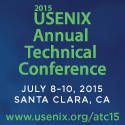You are here
Establishing a Base of Trust with Performance Counters for Enterprise Workloads
Andrzej Nowak, CERN openlab and École Polytechnique Fédérale de Lausanne (EPFL); Ahmad Yasin, Intel; Avi Mendelson, Technion—Israel Institute of Technology; Willy Zwaenepoel, École Polytechnique Fédérale de Lausanne (EPFL)
Understanding the performance of large, complex enterprise-class applications is an important, yet nontrivial task. Methods using hardware performance counters, such as profiling through event-based sampling, are often favored over instrumentation for analyzing such large codes, but rarely provide good accuracy at the instruction level.
This work evaluates the accuracy of multiple event-based sampling techniques and quantifies the impact of a range of improvements suggested in recent years. The evaluation is performed on instances of three modern CPU architectures, using designated kernels and full applications. We conclude that precisely distributed events considerably improve accuracy, with further improvements possible when using Last Branch Records. We also present practical recommendations for hardware architects, tool developers and performance engineers, aimed at improving the quality of results.
Open Access Media
USENIX is committed to Open Access to the research presented at our events. Papers and proceedings are freely available to everyone once the event begins. Any video, audio, and/or slides that are posted after the event are also free and open to everyone. Support USENIX and our commitment to Open Access.
author = {Andrzej Nowak and Ahmad Yasin and Avi Mendelson and Willy Zwaenepoel},
title = {Establishing a Base of Trust with Performance Counters for Enterprise Workloads},
booktitle = {2015 USENIX Annual Technical Conference (USENIX ATC 15)},
year = {2015},
isbn = {978-1-931971-225},
address = {Santa Clara, CA},
pages = {541--548},
url = {https://www.usenix.org/conference/atc15/technical-session/presentation/nowak},
publisher = {USENIX Association},
month = jul
}























connect with us